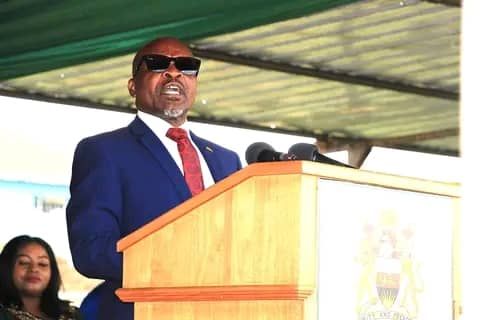News
Usi praises bishop Kaulanda’s exceptional leadership

By Chisomo Phiri
Vice President Dr. Michael Usi has praised Bishop Francis Kaulanda for his exceptional leadership during his tenure as the Bishop of the Lake Malawi Anglican Diocese.
Speaking at a farewell ceremony on Sunday, themed “Finishing the Race,”Usi commended Bishop Kaulanda for his humility, selflessness, and dedication to his faith.
“Bishop Kaulanda has demonstrated true leadership, showing that leadership is not just about power or authority, but about humility and serving others,” he said.

Usi also praised Bishop Kaulanda’s efforts in unifying the Anglican Diocese of Lake Malawi and his legacy of love, compassion, and unity.
The Vice President highlighted Bishop Kaulanda’s transformative leadership in education, particularly the establishment of the Lake Malawi Anglican University (LAMAU), as a testament to his visionary leadership and commitment to enhancing the nation’s educational landscape.
Usi also praised the collaborative efforts between the Anglican Church and the government in various developmental sectors, emphasizing the importance of such partnerships in advancing the nation’s progress and prosperity.
In his remarks,Bishop Kaulanda expressed his gratitude for the Vice President’s presence, acknowledging it as a testament to the strong partnership between the government and the Anglican Church.
“The shared objective of both the Anglican Church and the government is to serve the people of Malawi, highlighting the strong alliance between religious and state institutions in advancing the welfare of Malawians,” said Bishop Kaulanda.
Kaulanda was ordained as Bishop in the Anglican Church in 1986 and has served the church as a Priest and Bishop for 45 years.
He has served in various portfolios of the Anglican Church such as Diocesan Secretary and Diocesan Youth Coordinator, among others.
He has also served as Chairperson of the Public Accounts Committee in the Central Region and worked as a Board Member of Nice Trust and Chairperson of Micro-loan Foundation.






